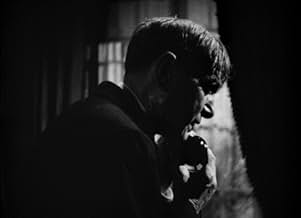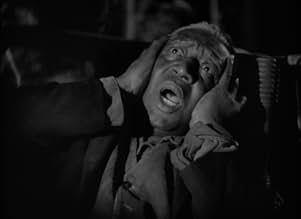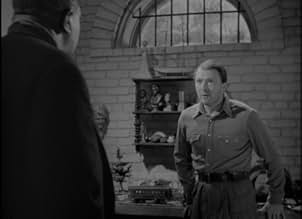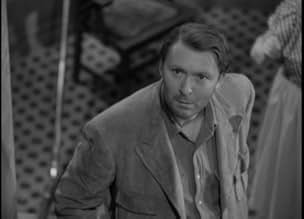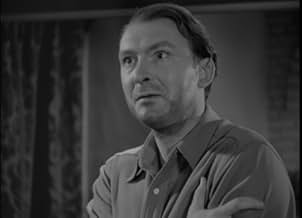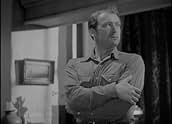IMDb-BEWERTUNG
6,4/10
901
IHRE BEWERTUNG
Füge eine Handlung in deiner Sprache hinzuA mentally unstable man who has been kept in isolation for years escapes and causes trouble for his identical twin brother.A mentally unstable man who has been kept in isolation for years escapes and causes trouble for his identical twin brother.A mentally unstable man who has been kept in isolation for years escapes and causes trouble for his identical twin brother.
Jane Allen
- Jitterbug Dancer
- (Nicht genannt)
Rod Cameron
- Eddie - Man in Cafe
- (Nicht genannt)
Eddy Chandler
- Motorcycle Cop
- (Nicht genannt)
Lane Chandler
- Neighbor
- (Nicht genannt)
Catherine Craig
- Second Mill Girl
- (Nicht genannt)
Empfohlene Bewertungen
Sharp, tightly paced low budget film is hard to categorize. There are definitely noirish tendencies but it's not a full blown film noir, there are also elements of horror contained within but neither is a horror movie. Even as a hybrid of different genres it is very involving and uses it short running time to full effect, actually so effective that it received quite a lot of critical attention in its day for a lower budget release and helped move its leading lady's career forward.
Speaking of the leading lady the film is also a study of two stars in flight. Susan Hayward whose full fledged stardom was still a few years away was still definitely on her way up, Frances Farmer, whose part is small, was most definitely on the descent. At one time considered an actress with the brightest of futures this was her second to last picture before descending into a decades long hell of mental illness and involuntary confinement.
The real standout though is Albert Dekker in a dual role of very different twin brothers. An excellent character actor who met a grisly end he rarely had the opportunity of the leading role but he takes his chance here and makes the most of it. His body language and vocal inflections makes the two characters recognizably different men and their struggles relatable. Not readily available and hard to find its definitely worth the effort to seek out.
Speaking of the leading lady the film is also a study of two stars in flight. Susan Hayward whose full fledged stardom was still a few years away was still definitely on her way up, Frances Farmer, whose part is small, was most definitely on the descent. At one time considered an actress with the brightest of futures this was her second to last picture before descending into a decades long hell of mental illness and involuntary confinement.
The real standout though is Albert Dekker in a dual role of very different twin brothers. An excellent character actor who met a grisly end he rarely had the opportunity of the leading role but he takes his chance here and makes the most of it. His body language and vocal inflections makes the two characters recognizably different men and their struggles relatable. Not readily available and hard to find its definitely worth the effort to seek out.
Although Among The Living is a B film from Paramount it's a real nugget of gold among a lot of B dross. You will rarely see mob violence depicted as well as in this film. Two films that this stands comparison with in that regard are Fury and Night Of The Hunter.
It's also a great example of the mobility of careers. Frances Farmer whose career was heading down is in a relatively colorless part of the wife of one Albert Dekker. Susan Hayward plays the slutty daughter of a boardinghouse owner who gets involved with the other twin Dekker. She's got the far juicier role and makes the most of it.
Once upon a time a man had two twin sons both of whom grew up to be Albert Dekker. As is told by the town doctor Harry Carey, one was sent to a prep school, the other stayed at home. By all accounts dad was a tyrant at home and at work where he owned the mill that employed most of the town. The twin that stayed at home witnessed dad beating on mom and tried to stop it. Dad picked him and threw him against a wall injuring his brain.
Rather than risk exposure dad had his friend Harry Carey fake a death certificate and they kept the kid in a locked room. Now father is dead and the kid who has grown up to be Albert Dekker is a now quite unhinged and murders a family servant to escape.
And while out murders a woman that the town blames his brother for. Quite a dilemma for the sane Dekker and wife Farmer.
Hayward gives a good account of herself, but the film really belongs to Albert Dekker. This is quite possibly his career film, even more so than Dr. Cyclops. Especially playing the mad son, you really do feel for him knowing it's not his fault the way he is.
With a good does of both noir and Gothic horror, I highly recommend this film for fans of both genres. And definitely for fans of Susan Hayward as I am.
It's also a great example of the mobility of careers. Frances Farmer whose career was heading down is in a relatively colorless part of the wife of one Albert Dekker. Susan Hayward plays the slutty daughter of a boardinghouse owner who gets involved with the other twin Dekker. She's got the far juicier role and makes the most of it.
Once upon a time a man had two twin sons both of whom grew up to be Albert Dekker. As is told by the town doctor Harry Carey, one was sent to a prep school, the other stayed at home. By all accounts dad was a tyrant at home and at work where he owned the mill that employed most of the town. The twin that stayed at home witnessed dad beating on mom and tried to stop it. Dad picked him and threw him against a wall injuring his brain.
Rather than risk exposure dad had his friend Harry Carey fake a death certificate and they kept the kid in a locked room. Now father is dead and the kid who has grown up to be Albert Dekker is a now quite unhinged and murders a family servant to escape.
And while out murders a woman that the town blames his brother for. Quite a dilemma for the sane Dekker and wife Farmer.
Hayward gives a good account of herself, but the film really belongs to Albert Dekker. This is quite possibly his career film, even more so than Dr. Cyclops. Especially playing the mad son, you really do feel for him knowing it's not his fault the way he is.
With a good does of both noir and Gothic horror, I highly recommend this film for fans of both genres. And definitely for fans of Susan Hayward as I am.
The plot to "Among the Living" is silly and impossible to believe. However, it does appear to be the inspiration for an episode of "The Simpsons"--the one where Bart discovers that he has an identical 'evil' twin who's been locked in the attic for many years! Homer and Marge feed Hugo fish heads and have kept his existence a secret for years! Who would have thought a film would have dared have such a bizarro plot?!
When the film begins, the family patriarch dies and his son John (Albert Dekker) arrives for the funeral. Little does John know that his identical brother, Paul (also Dekker), is STILL alive and did not die as a small child. The family doctor (Harry Carey) divulges the family secret to John...Paul is still alive and insane and has been kept hidden in a secret room in the family mansion! Coincidentally, at this same time, Paul kills his keeper and escapes! Now two identical looking guys are running about town...and one is on occasion unpredictable and homicidal. So it's up to the Doctor and John to try to find Paul...however the heartless Doctor soon tries to stop John from contacting the police by threatening to destroy him! However, Paul is not intend with only killing his keeper...and the bodies start piling up in town. And, soon John is assumed to be the crazed killer by mistake!
As I mentioned above, the plot for this one is just insane...so you really have to suspend disbelief in order to watch this one. Despite this, I did enjoy Dekker's performance as he played both characters, particularly Paul, quite well. Goofy and still very watchable.
When the film begins, the family patriarch dies and his son John (Albert Dekker) arrives for the funeral. Little does John know that his identical brother, Paul (also Dekker), is STILL alive and did not die as a small child. The family doctor (Harry Carey) divulges the family secret to John...Paul is still alive and insane and has been kept hidden in a secret room in the family mansion! Coincidentally, at this same time, Paul kills his keeper and escapes! Now two identical looking guys are running about town...and one is on occasion unpredictable and homicidal. So it's up to the Doctor and John to try to find Paul...however the heartless Doctor soon tries to stop John from contacting the police by threatening to destroy him! However, Paul is not intend with only killing his keeper...and the bodies start piling up in town. And, soon John is assumed to be the crazed killer by mistake!
As I mentioned above, the plot for this one is just insane...so you really have to suspend disbelief in order to watch this one. Despite this, I did enjoy Dekker's performance as he played both characters, particularly Paul, quite well. Goofy and still very watchable.
Deranged twin brother escapes home confinement after father's death and tries to fit into a new life.
Wacky, highly original horror story. When the luscious Hayward (Millie) makes her entrance at the stairs' top, it's like an explosion of saucy sex appeal. There's enough lively personality there to light up the room. In fact, her gold-digging coquette manages to steal the film. And that's against tough competition from Dekker as the wide-eyed, strangely sympathetic mad strangler. Together, they're easily one of filmdom's genuine odd couples.
Frankly, the story at times makes little sense. But that's okay because it's the characters and Gothic atmosphere that distinguish the film. It's also one of the few films where the camera pans through a hellish mansion, only to focus finally on a guy in a straitjacket (Dekker as the mad Paul), of all things.
Catch that opening scene with the unemployed mill workers taunting the funeral rites for the mill owner. In fact, there's an odd class undercurrent to the screenplay as a whole. Considering that blacklisted leftist Lester Cole did both the story and the script, that's not surprising.
Moreover, the screenplay can be viewed as something of an allegory with mad brother Paul as the brutalized innocent, who would like to side with the workers (he prefers living with them), but has been too damaged by his mill owner father to be able to. In that sense, he suggests Dad's repressed (straitjacketed) humane side hidden away from public view, but finally released by Dad's death into a world his now childlike nature can't comprehend. More tragically, he can only relieve a woman's scream of pain by strangling her, the memory of his abused mother and his attempt to help still fresh in his mind. Dekker's affecting performance with its unexpected degree of pathos underscores, I believe, something of this way of looking at things.
Director Heisler certainly has a flair for exciting crowd scenes. That clip joint with its frenetic swing dancers is a marvel of editing and atmosphere, a really memorable scene. And those teeming street crowds add both color and more atmosphere. The movie's commanding visuals owe a lot to the underrated Heisler. Too bad, however, the talented Frances Farmer is largely wasted in a brief, conventional role.
Anyway, in my little book, the movie's a one-of-a-kind that rises above the ordinary B- feature or horror film, and should not be missed.
Wacky, highly original horror story. When the luscious Hayward (Millie) makes her entrance at the stairs' top, it's like an explosion of saucy sex appeal. There's enough lively personality there to light up the room. In fact, her gold-digging coquette manages to steal the film. And that's against tough competition from Dekker as the wide-eyed, strangely sympathetic mad strangler. Together, they're easily one of filmdom's genuine odd couples.
Frankly, the story at times makes little sense. But that's okay because it's the characters and Gothic atmosphere that distinguish the film. It's also one of the few films where the camera pans through a hellish mansion, only to focus finally on a guy in a straitjacket (Dekker as the mad Paul), of all things.
Catch that opening scene with the unemployed mill workers taunting the funeral rites for the mill owner. In fact, there's an odd class undercurrent to the screenplay as a whole. Considering that blacklisted leftist Lester Cole did both the story and the script, that's not surprising.
Moreover, the screenplay can be viewed as something of an allegory with mad brother Paul as the brutalized innocent, who would like to side with the workers (he prefers living with them), but has been too damaged by his mill owner father to be able to. In that sense, he suggests Dad's repressed (straitjacketed) humane side hidden away from public view, but finally released by Dad's death into a world his now childlike nature can't comprehend. More tragically, he can only relieve a woman's scream of pain by strangling her, the memory of his abused mother and his attempt to help still fresh in his mind. Dekker's affecting performance with its unexpected degree of pathos underscores, I believe, something of this way of looking at things.
Director Heisler certainly has a flair for exciting crowd scenes. That clip joint with its frenetic swing dancers is a marvel of editing and atmosphere, a really memorable scene. And those teeming street crowds add both color and more atmosphere. The movie's commanding visuals owe a lot to the underrated Heisler. Too bad, however, the talented Frances Farmer is largely wasted in a brief, conventional role.
Anyway, in my little book, the movie's a one-of-a-kind that rises above the ordinary B- feature or horror film, and should not be missed.
AMONG THE LIVING (Paramount, 1941), directed by Stuart Heisler, is not a horror film in a sense of living dead characters of "Dracula" or "The Mummy," but an original story by Brian Marlowe and Lester Cole revolving around twin brothers, one good and the other criminally insane. Starring Albert Dekker in one of his rare leading roles following his top-star title role as DOCTOR CYCLOPS (Paramount, 1940), AMONG THE LIVING was actually the studio's follow-up attempt of giving Dekker double exposure with the opportunity playing two basic characters in one basic melodrama.
The story, set in the Southern mining town of Raden, begins in atmospheric tradition, at the cemetery gathering of the burial of industrialist, Maxim Raden. In attendance are Raden's son, John (Albert Dekker) and his wife, Elaine (Frances Farmer), from New York, along with Raden's family physician and best friend of 35 years, Doctor Ben Saunders (Harry Carey). As much as John's twin brother, Paul, had died when the brothers were ten-years- old, it is soon discovered that Paul (Albert Dekker) is very much alive. Having spent years in an insane asylum from which he has escaped, he is now kept in the cellar of the decapitated Raden estate confined in a strait jacket by the family caretaker, Pompey (Ernest Whitman) until the funeral is over. Soon after, Paul is released from confinement by Pompey, whom he later kills. As Paul walks aimlessly towards the nearby town, John learns the truth about his brother and how Saunders falsified Paul's death certificate, substituting a dead child in place of Paul buried next to their deceased mother, Lucy. Fearing of being sent back to the asylum, Paul hides himself in a boardinghouse managed by landlady, Mrs. Pickens (Maude Eburne). Her daughter, Millie (Susan Hayward), takes an interest in "Mr. Paul," especially after giving her money to buy a new dress. Her involvement with the new boarder stirs up jealously from her boyfriend, Ben Oakley (Gordon Jones - Mike the cop on television's "The Abbott and Costello Show" in the 1950s). After Paul locates his brother staying with his wife at the Raden Hotel, he is soon frightened away, ending up at the River Bottom Cafe. While there, Paul makes the acquaintance with sassy blonde, Peggy Nolan (Jean Phillips), whom he likes but loses. Because she made a fool out of him, Paul follows her home and kills her. To prevent any more killings, John is advised to place a $5,000 reward for his brother's capture. The reward forms a vigilante group of greedy townspeople, especially that of Millie, still unaware of Mr. Paul's identity.
Also in the cast include: Frank M. Thomas (Sheriff Andrew Ramsey); Rod Cameron (Bill); and Clarence Muse (The Cafe Waiter). Dorothy Sebastian, a secondary actress having worked opposite such top-stars as Joan Crawford and Greta Garbo for Metro-Goldwyn-Mayer during the silent film era 1920s, appears briefly as a cafe patron surrounded by jitterbug dancers.
In spite of its second feature presentation of 68 minutes, AMONG THE LIVING is an exceptional "B" product. Albert Dekker, noted for secondary roles, gives one of his finer lead performances. In typical fashion, the good brother is ordinary while his mentally unbalanced other in unshaven face gathers the most attention. Gothic style photography and eerie underscoring offers AMONG THE LIVING added points of interest. While Frances Farmer showed great promise for her dual roles in COME AND GET IT (Samuel Goldwyn, 1936), she's virtually wasted here with nothing challenging except for facial gestures and a scream. The young and upcoming, Susan Hayward, appearing 25 minutes into the story, gets the best attention here as the flirtatious landlady's daughter who's "not afraid of anything, not even death!"
Unseen regularly on commercial television since the 1970s (notably New York City's WNEW, Channel 5, where it was last shown in 1978), AMONG THE LIVING, which has never been distributed to video cassette nor broadcast on cable television, has become available on DVD. Regardless, AMONG THE LIVING remains one of those truly obscure movies that deserves rediscovery. Even if this being just another twin versus twin theme, the performances by Albert Dekker, Susan Hayward, and sinister atmosphere rise above routine material (***)
The story, set in the Southern mining town of Raden, begins in atmospheric tradition, at the cemetery gathering of the burial of industrialist, Maxim Raden. In attendance are Raden's son, John (Albert Dekker) and his wife, Elaine (Frances Farmer), from New York, along with Raden's family physician and best friend of 35 years, Doctor Ben Saunders (Harry Carey). As much as John's twin brother, Paul, had died when the brothers were ten-years- old, it is soon discovered that Paul (Albert Dekker) is very much alive. Having spent years in an insane asylum from which he has escaped, he is now kept in the cellar of the decapitated Raden estate confined in a strait jacket by the family caretaker, Pompey (Ernest Whitman) until the funeral is over. Soon after, Paul is released from confinement by Pompey, whom he later kills. As Paul walks aimlessly towards the nearby town, John learns the truth about his brother and how Saunders falsified Paul's death certificate, substituting a dead child in place of Paul buried next to their deceased mother, Lucy. Fearing of being sent back to the asylum, Paul hides himself in a boardinghouse managed by landlady, Mrs. Pickens (Maude Eburne). Her daughter, Millie (Susan Hayward), takes an interest in "Mr. Paul," especially after giving her money to buy a new dress. Her involvement with the new boarder stirs up jealously from her boyfriend, Ben Oakley (Gordon Jones - Mike the cop on television's "The Abbott and Costello Show" in the 1950s). After Paul locates his brother staying with his wife at the Raden Hotel, he is soon frightened away, ending up at the River Bottom Cafe. While there, Paul makes the acquaintance with sassy blonde, Peggy Nolan (Jean Phillips), whom he likes but loses. Because she made a fool out of him, Paul follows her home and kills her. To prevent any more killings, John is advised to place a $5,000 reward for his brother's capture. The reward forms a vigilante group of greedy townspeople, especially that of Millie, still unaware of Mr. Paul's identity.
Also in the cast include: Frank M. Thomas (Sheriff Andrew Ramsey); Rod Cameron (Bill); and Clarence Muse (The Cafe Waiter). Dorothy Sebastian, a secondary actress having worked opposite such top-stars as Joan Crawford and Greta Garbo for Metro-Goldwyn-Mayer during the silent film era 1920s, appears briefly as a cafe patron surrounded by jitterbug dancers.
In spite of its second feature presentation of 68 minutes, AMONG THE LIVING is an exceptional "B" product. Albert Dekker, noted for secondary roles, gives one of his finer lead performances. In typical fashion, the good brother is ordinary while his mentally unbalanced other in unshaven face gathers the most attention. Gothic style photography and eerie underscoring offers AMONG THE LIVING added points of interest. While Frances Farmer showed great promise for her dual roles in COME AND GET IT (Samuel Goldwyn, 1936), she's virtually wasted here with nothing challenging except for facial gestures and a scream. The young and upcoming, Susan Hayward, appearing 25 minutes into the story, gets the best attention here as the flirtatious landlady's daughter who's "not afraid of anything, not even death!"
Unseen regularly on commercial television since the 1970s (notably New York City's WNEW, Channel 5, where it was last shown in 1978), AMONG THE LIVING, which has never been distributed to video cassette nor broadcast on cable television, has become available on DVD. Regardless, AMONG THE LIVING remains one of those truly obscure movies that deserves rediscovery. Even if this being just another twin versus twin theme, the performances by Albert Dekker, Susan Hayward, and sinister atmosphere rise above routine material (***)
Wusstest du schon
- WissenswertesJane Allen's debut.
- Zitate
Mrs. Pickens: I had one of them Frenchmen living here last year. Honest to goodness every time you'd turn 'round, that Frenchman was grabbin' your hand and kissing until he'd like to pull the skin off.
Top-Auswahl
Melde dich zum Bewerten an und greife auf die Watchlist für personalisierte Empfehlungen zu.
- How long is Among the Living?Powered by Alexa
Details
- Erscheinungsdatum
- Herkunftsland
- Sprache
- Auch bekannt als
- Among the Living
- Drehorte
- Produktionsfirma
- Weitere beteiligte Unternehmen bei IMDbPro anzeigen
- Laufzeit1 Stunde 7 Minuten
- Farbe
- Sound-Mix
- Seitenverhältnis
- 1.37 : 1
Zu dieser Seite beitragen
Bearbeitung vorschlagen oder fehlenden Inhalt hinzufügen

Oberste Lücke
By what name was Zum Leben verdammt (1941) officially released in India in English?
Antwort
